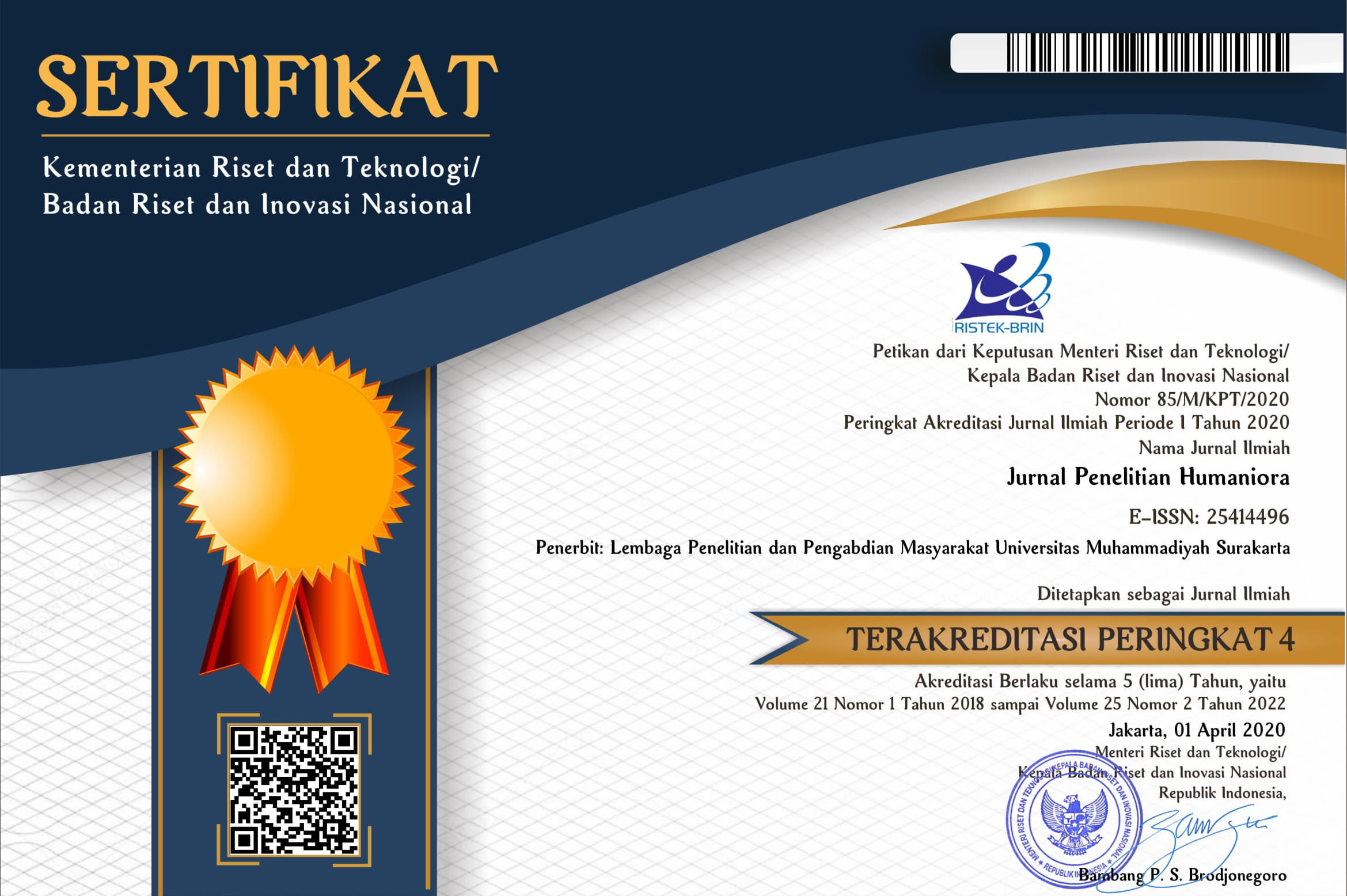VARIASI PERSEPSI SISWA TERHADAP MAKNA HAKIKI DAN MAKNA KONTEKSTUAL KATA TOLERANSI DALAM KEHIDUPAN BERAGAMA
Main Sufanti(1*), Aan Sofyan(2), Atiqa Sabardila(3), Fitri Puji Rahmawati(4)(1) Universitas Muhammadiyah Surakarta
(2) Universitas Muhammadiyah Surakarta
(3) Universitas Muhammadiyah Surakarta
(4) Universitas Muhammadiyah Surakarta
(*) Corresponding Author
Abstract
The purpose of this study is to describe: (1) students’ perception of the essential meaning of the word tolerance on religious life and (2) students’ perception of the contextual meaning of the word tolerance in religious life. The subjects were high school students Muhammmadiyah 1 and 2 Surakarta, total number of students, 97. Data were collected with an open questionnaire and interviews and analyzed with interactive analysis. The results showed that (1) threre were thirteen variations of students’ perception of the essential meaning of the word tolerance in religious life, (2) there were nine students’ perception of the contextual meaning of religious tolerance. Most of the thirteen perceptions were substantially similar to those of the KBBI (2007), however, having shorter and different wordings. The perception that semantically the same substance is dealing with respect other religions, while those with different wordings but semantically the same are not to insult, criticize, or make fun of other people of different religions, to know and understand other religious life, no discrimination to others, a sense of mutual need between one individual to another individual, tolerant of others, caring for others, respect other religions, maintaining good relations between people, not overbearing, giving opportunity to others, living in harmony, and mutual assistance in the community. The perception of the meaning of the word tolerance varies contextually as the following: having exactly the same wordings, having different wordings but semanti cally the same, and having different contextual meanings.
Keywords
Full Text:
PDFReferences
Alwi, Hasan, et al. 2007. Kamus Besar Bahasa Indonesia. Jakarta: Balai Pustaka. Alwisol. 2009. Psikologi Kepribadian. Malang: UMM Press.
Arofah, Lailatul. 2010. “Pola Pendidikan Islam dalam mewujudkan Kerukunan Hidup antar Umat Beragama di Desa Deyangan Kecamatan Mertoyudan, Kabupaten Magelang Tahun 2009.” http://perpus.stainsalatiga.ac.id/seg.php?a=detil&id=246. Diakses 14April 2013 pukul 4.53 WIB.
Bisri, A. Zaini. 2013. “Legitimasi Kekerasan atas Nama Agama” dalam Suara Merdeka, 28 Juli 2013.
Endang, Busri. 2013. “Mengembangkan Sikap Toleransi dan Kebersamaan di Kalangan Siswa”. Jurnal Visi Ilmu Pendidikan (J-VIP), vol. 10, no. 1, edisi Januari 2013, Jurusan Ilmu Pendidikan FKIP Universitas Tanjungpura.
Markhamah dan Atiqa Sabardila. 2011. “Model Pendidikan Toleransi Kehidupan Beragama di Lingkungan Perguruan Tinggi”. Surakarta: Universitas Muhammadiyah Surakarta.
Masngud. 2010. Pendidikan Multikultural: Pemikiran dan Upaya Implementasinya, Yogyakarta: Idea Pres.
Muliadi, Erlan. 2012. “Urgensi Pembelajaran Pendidikan Agama Islam Berbasis Multikultural di Sekolah” dalam Jurnal Pendidikan Islam,vol. I, no.1, Juni 2012.
Musrih, Khaerudin. 2010. “Pola Komunikasi Pimpinan Forum Kerukunan Umat Beragama (FKUB) Kab. Banyumas dalam Meningkatkan Kerukunan antar Umat Beragama”. Jurusan Komunikasi dan Penyiaran Islam UIN Syarif Hidayatullah Jakarta. http://tulis.uinjkt.ac.id/ opac/themes/katalog/detail.jsp?id=92699&lokasi=lokal. Diakses 14 April 2013.
Pateda, Mansyur. 1985. Semantik Leksikal. Flores: Nusa Indah.
Syaefudin, A.F. 2006. “Membumikan Multikulturalisme di Indonesia”. Jurnal Antropologi Sosial Budaya-Etnovisi, Vol.II, No. 1 April 2006. Medan: Universitas Sumatera Utara.
Syafruddin; Nor Ipansyah; Ahmad Rijali. 2010. “Kerukunan Hidup Beragama di Kecamatan Halong Kabupaten Balangan”. IAIN Antasari. http://puslit.iain-antasari.ac.id/kerukunan-hidup- beragama-di-kecamatan-halong-kabupaten-balangan/. Diakses 14 April 2013 ja, 5.17 WIB.
Suryana, Toto. 2011. “Konsep dan Aktualisasi Kerukunan antarumat Beragama” dalam Jurnal Pendidikan Agama Islam Ta’lim, vol. 9, no. 2, hlm. 127.
Article Metrics
Abstract view(s): 949 time(s)PDF: 1313 time(s)
Refbacks
- There are currently no refbacks.











